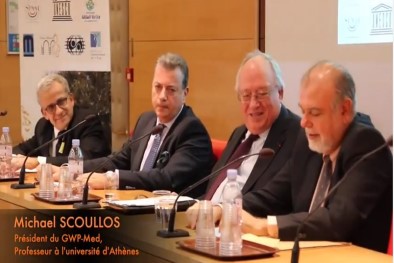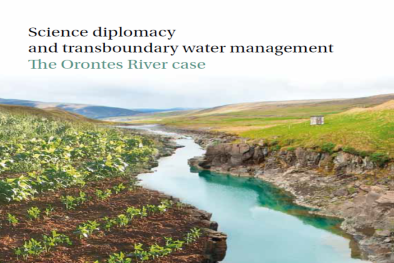GWP-Med Chair, Prof. Michael Scoullos, was among the book’s editors while also contributing to contents with a chapter on “Orontes hydro-diplomacy: historical overview and Lebanon’s transboundary water treaties”, developed jointly with Dr. Fadi Comair from the Mediterranean Network of Basin Organizations (MENBO). The book was the result of collaboration between UNESCO, the Universities of Insubria and Milan, GWP-Med and MENBO, all of which have, one way or another, longstanding experience in dealing with transboundary water issues[1]. Moreover, the role of GWP-Med was instrumental in the design, implementation and peer reviewing of the field and laboratory work for Orontes carried out in close cooperation with the University of Texas at Austin, USA, within the ICT project supported by Italy.
The book provides a historical overview on hydro-diplomacy and transboundary water treaties in Lebanon, analyzes Turkey’s and Syria’s foreign policy orientation and perspective on transboundary water management and the link to the Orontes Basin, towards building efficient governance models. Given the multiple water and security challenges in the Orontes River Basin, the book elaborates on the introduction of new ICT tools for sustainable basin management and improved cooperation, touching upon related technical perspectives, data analysis and decision support tools towards policy development. Lessons learned for developing scenarios beyond the Orontes river basin are also provided.
The Orontes River case provides valid background on cooperation processes for transboundary water resources by addressing key aspect of dealing with poor hydraulic resources in the region, limiting climate change effects for the riparian countries, improving access to sufficient quantities of good quality water for vulnerable populations, and improving water demand responses.
With water being a vital and strategic natural resource with great economic and development potential that can, therefore, easily become a source of cross-border and interstate risk, hydro-diplomacy is on the focus of the diplomatic agenda of the countries in the region that face extremely serious problems of water shortages interlinked with complex geopolitical issues. Taking into consideration that conflict and cooperation in the region frequently co-exist, the handbook aims to assist governments in adopting cooperation policies and practices, and facilitating the development of a new “water culture” between peoples in the region, as a means for reconciliation, peace, solidarity, prosperity, as well as mutual understanding, confidence and respect.
In order to guarantee cooperation based on resources’ availability and equitable sharing for meeting current and future needs, hydro-diplomacy has to explore all possible options for consensus building by using reliable scientific evidence, observing both traditional bilateral approaches and international law, pursuing new methods and tendencies, considering the most vulnerable communities and enhancing social and economic development prospects. This concept has been applied in the Orontes Basin through negotiations between Lebanon and Syria leading to the 2002 Agreement, contributing to the reduction of injustice and inequities at transboundary and national level.

Prof. Scoullos was invited to present the publication on the Orontes River case study at the conference on “Hydro-diplomacy and climate change for Peace in the Middle East” (1 December 2015, Paris), under the auspices of the French Senate and the Lebanese Ministry of Energy and Water, in the framework of the United Nations Climate Change Conference COP21. His presentation is available, along with the Q&As session that followed, and the closing session with the final remarks. The panel also included the French Senator Mr. Olivier Cadic, the Lebanese Minister of Energy and Water Mr. Arthur Nazarian, the Director General of the Lebanese Ministry as well as MENBO Honorary President Dr. Fadi Comair, and the President of the International Office for Water Mr. Pierre Roussel.
